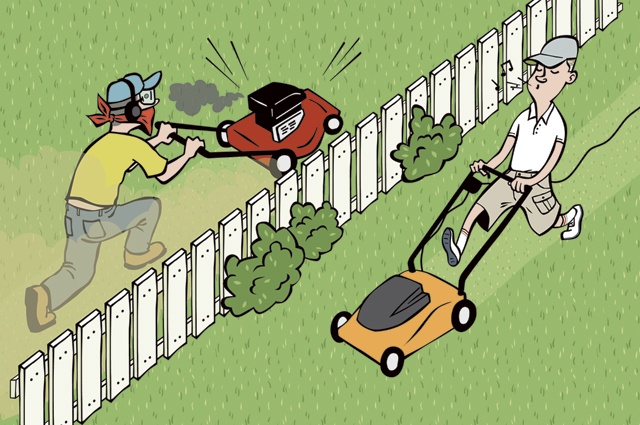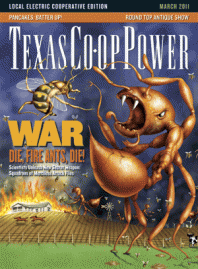Most summer weekends are filled with the sounds of splashing in swimming pools and the steady noise of lawn mowers. Mowers and other gasoline-powered lawn equipment roar to life in many neighborhoods to keep yards beautiful. However, these small engines emit a large amount of pollution. By some Environmental Protection Agency (EPA) estimates, engines used to maintain lawns and gardens account for 5 percent of U.S. air pollution.
Most of us love the look of a well-manicured lawn. But mowing is a chore, and gasoline-powered mowers are an assault on peace and quiet—just ask someone who wanted to sleep in on a Saturday morning when a neighbor decided to get an early start on the yard work.
The air pollution emitted by gasoline-powered lawn mowers and other yard equipment is significant. According to the EPA, operating a gasoline-powered mower for one hour produces the same amount of smog-forming hydrocarbons as driving a vehicle almost 200 miles.
As with any fuel-powered motor, lawn mowers and other yard equipment emit carbon monoxide, a colorless, odorless gas toxic to humans. The engines also emit unburned hydrocarbons and nitrogen oxide, which contribute to the formation of ground-level ozone. New rules governing emissions from small engines are expected to go into effect in the next year or two.
In the meantime, there are options for reducing noise and air pollution and still maintaining a beautiful lawn.
The best option might be a manual, or push, reel mower. With no engine, the mower produces little noise, save for the satisfying sound of blades cutting grass.
Reel mower prices start at around $70. To maximize their effectiveness, the blades should be sharpened regularly and the wheels lubricated. These mowers can last years with proper care. Though it’s still hard to push a reel mower through tall grass, today’s models are lighter and easier to maneuver than those of several decades ago. They are best suited for smaller yards but can be used on any size lawn as long as the person pushing the mower has plenty of energy.
Electric- and battery-powered mowers offer another clean alternative. Like gas mowers, they are motorized but are much quieter and emit no direct pollutants. Electric mowers can be corded or cordless.
Costs for a corded mower can range from $150 to more than $400—similar to the cost of a gas-powered mower. However, corded mowers do come with one big annoyance: They must be connected to the house via an extension cord, and users must also be careful not to run over the cord with the mower.
Cordless, rechargeable mowers can range from $200 to more than $500. They are more convenient than corded mowers and are powered by a removable, rechargeable battery. Limitations of rechargeable mowers are the size of the yard and the life of the battery pack. Many manufacturers claim that their cordless mowers can mow 1/3 to 1/2 an acre during a cutting time of 45 to 60 minutes. Actual times will vary depending on the age of the battery, height of the grass and how quickly the user can get the job done.
In recent years, the choice in cordless mowers has expanded, with models introduced by well-established companies such as Toro and Black & Decker and new entrants coming from makers such as Neuton. But given the cost of cordless mowers, careful attention should be paid to the brand and model being purchased. Customer reviews online are a helpful resource.
Gasoline-powered lawn mowers are a noisy, ubiquitous part of our culture. However, in the face of rising fuel costs and environmental concerns, more people are switching to nonpolluting, human-powered mowers or electric varieties that won’t disturb your neighbor’s summer nap or pollute the atmosphere.
——————–
Brian Sloboda is a program manager specializing in energy efficiency for the Cooperative Research Network, a service of the Arlington, Virginia-based National Rural Electric Cooperative Association.


